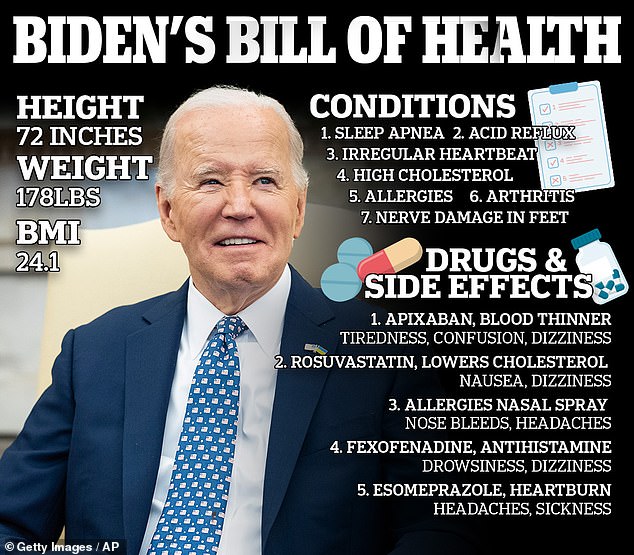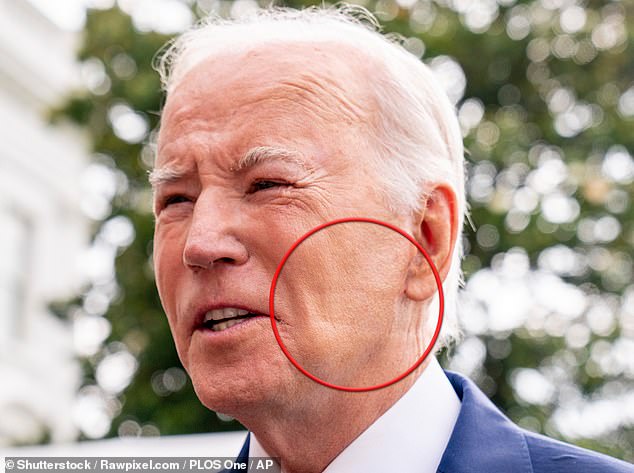President Joe Biden’s annual physical revealed no “new concerns” but shed more light on several health conditions the 81-year-old suffers from.
Dr. Kevin O’Connor said the “most notable” change last year had to do with Biden’s sleep apnea, a disorder the president has had for 16 years that is associated with an increased risk of dementia.
The White House doctor said that last spring Biden began wearing a mask that delivers pressurized air to his nose and mouth to make sure he breathes properly when he sleeps.
“We revisited the issue last spring and performed a formal sleep study,” Dr. O’Connor wrote in his summary. “This study confirmed my suspicion that the president could do with optimizing his sleep efficiency with a PAP (breathing device).”

It has been well documented since 2008 that the president suffers from this condition, but the notes indicate that there were signs that it could worsen.
Last year, Biden was photographed with marks on his face, which the White House later said were from a CPAP machine used to monitor his condition.
More than 30 million Americans are diagnosed with sleep apnea, which causes sufferers to snore, choke and gasp 20 to 30 times every hour during the night.
And the older a person is, the more severe the effects of the disorder can be.
A 2022 study They found that patients with sleep apnea had a 43 percent higher risk of developing any type of neurocognitive disorder, a 28 percent higher risk of Alzheimer’s disease, and a 54 percent higher risk of Parkinson’s disease.
Doctors say the link to dementia is probably because the brain lacks oxygen during sleep, which can damage blood vessels and upset the balance of an enzyme that helps regulate the protein that causes plaque.
Dr. O’Connor said the White House medical team experimented with several different types of masks before finding one comfortable enough for Biden to wear throughout the night.
“Most people experience some difficulty getting used to falling asleep with a mask on their face, as well as keeping it on throughout the night,” the notes say.
‘This is reasonably anticipated and, indeed, should be expected. The president had a very similar experience. But with testing several different masks, we have been able to identify a couple of products that fit it very comfortably and effectively.”
Dr. O’Connor wrote in his medical summary that the president’s sleep apnea condition is “stable” and that he “has demonstrated an excellent response to PAP and is diligently complying with therapy.”
The doctor added: “He remains fit to perform his duties and fully executes all of his responsibilities without any exemption or accommodation.”
Another major health event over the past year, Dr. O’Connor wrote, was a dental emergency the president suffered that required him to undergo an urgent root canal in June.
The doctor said there were no complications and that Biden, known for his love of ice cream, recovered well.
Biden’s routine physical exam included consultations with doctors specializing in optometry, dentistry, orthopedics, neurology, physical therapy, cardiology and dermatology.
The White House confirmed that the president did not undergo any cognitive testing.
However, he did undergo “an extremely detailed neurological examination” that ruled out “stroke, multiple sclerosis, Parkinson’s or ascending lateral sclerosis.”
Neurological exams include CT and MRI scans of the brain, conduction studies to evaluate the nerves, and electroencephalography (EEG) or electromyography (EMG) to measure brain activity and nerve function.
Cognitive tests measure cognition and brain function and processing. They include: number and word recall tests, drawing tests, tests that measure attention, language and reasoning, and questionnaires.


Biden was photographed last year with a mark on his face that was later revealed to have been caused by wearing a mask to treat his sleep apnea.


Marine One is seen landing at Walter Reed National Military Medical Center in Bethesda, Maryland, as President Joe Biden arrived for his physical on Wednesday.
DailyMail.com revealed earlier this month the cognitive test Biden may have to take if his doctor deems it necessary.
In addition to sleep apnea, the physical examination revealed that Biden has an irregular heartbeat, or atrial fibrillation, which causes an irregular and often unusually fast heartbeat and dramatically increases the risk of having a stroke.
The president has suffered from this condition since 2003. He takes the anticoagulant apixaban, brand name Eliquis, to treat the heart condition.
Cardiac arrhythmia can cause a variety of serious heart health complications, including blood clots.
If a blood clot breaks loose, it can travel directly from the heart to the brain, which can cause a stroke, which is why people with irregular heartbeats are up to five times more likely to suffer a stroke.
Biden also has high cholesterol, which is controlled with statins that should prevent the problem from developing into hardened arteries or something more serious.
The other conditions noted on his physical examination have been previously documented. They include acid reflux, seasonal allergies, stiff gait and damage to the nerves in the feet.
Dr O’Connor noted that all of these were “stable” with no change since the last examination.
For his various conditions, the president takes the blood thinner Apixaban, rosuvastatin to lower cholesterol, nasal sprays for allergies, famotidine for acid reflux and esomeprazole for heartburn.
These medications can cause adverse side effects, such as confusion, dizziness, headaches, anxiety, agitation, and drowsiness.

